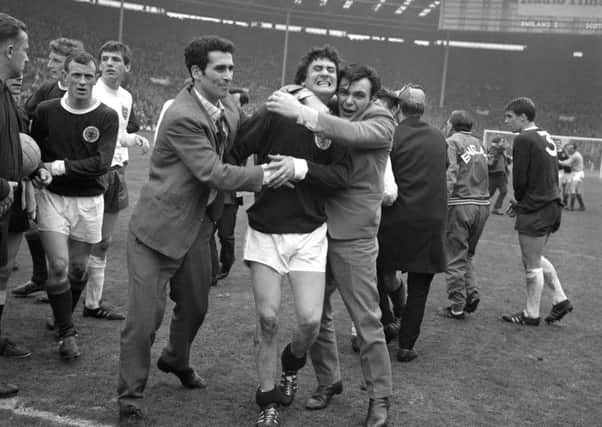5 things you should know about Scotland's 1967 Wembley win
This article contains affiliate links. We may earn a small commission on items purchased through this article, but that does not affect our editorial judgement.


Here Andy Newport takes a look at five memorable aspects of the Scots’ 3-2 win.
1. End of the world for England
Advertisement
Hide AdAdvertisement
Hide AdEngland had enjoyed an imperious start to their reign as world champions and were looking to extend a 19-match unbeaten run when they welcomed the Scots to London. Little did the hosts know, but a 50-year run without worthwhile silverware would follow the loss. Sir Alf Ramsey’s men relinquished their title in Mexico in 1970 after crashing out to West Germany in the quarter-finals and have failed to reach another final since.
2. Scots show off their swagger
This truly was a golden era for Scottish football. Within six weeks of Bobby Brown’s men shooting down the Auld Enemy, four members of the starting XI - goalkeeper Ronnie Simpson, left-back Tommy Gemmell and forwards Willie Wallace and Bobby Lennox - helped Celtic become the first British side to be crowned champions of Europe. The Rangers pair of John Greig and Ronnie McKinnon were also involved at Wembley but saw their club side narrowly lose to Bayern Munich in the Cup Winners’ Cup final. Celtic reached the final again three years later but lost out to Feyenoord, while Gers did win it in 1972. However, Scotland’s run as ‘unofficial world champions’ did not last long - they surrendered the title to the USSR a month later.
3. Age is no barrier
Simpson was a late bloomer when it came to international football and was making his Scotland debut at Wembley at the age of 36. But he was by no means over the hill and proved his agility by helping Jock Stein’s Hoops see off Inter Milan in Lisbon. Remarkably, he would win just four more caps - scant reward for a man who had represented Great Britain’s amateur football team at the 1948 Olympics and who would later win two FA Cup winners’ medals while playing with Newcastle.
4. Change is coming
England’s hopes of seeing off the determined Scots suffered a major setback within the first 15 minutes when defender Jack Charlton suffered a broken toe. Although substitutions had been permitted in English league football since 1965 (Scotland followed a year later) they were still not generally allowed in international competition, meaning Charlton had to limp on for the rest of the game after being moved up front. He still played his part by netting England’s first goal but the frustration over the impact injuries were having on major clashes ensured substitutions were in place for the Mexcio World Cup three years later.
5. Standing room only
If you were not among the 99,063-strong crown at Wembley, you will not have seen Scotland’s greatest victory as it unfolded. Unlike today, the match was not deemed important enough to be shown live - and only the second half was covered by radio commentators. It was the only time during the 1960s the BBC did not cover the annual clash between Scotland and England but Scottish TV did screen three highlight programmes in the hours after the final whistle.
